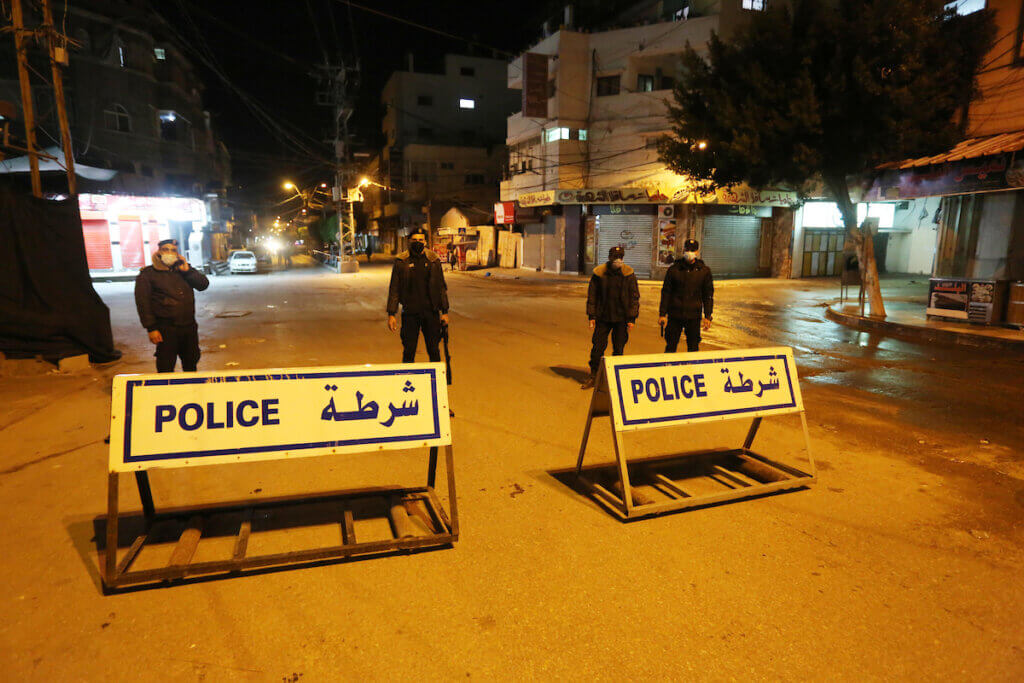- 275,479 Palestinians tested positive for COVID-19; 236,633 recoveries; 2,917 deaths
- Of Palestinians who tested positive, 179,039 live in the West Bank, 67,854 live in Gaza, and 28,586 live in East Jerusalem
- 833,707 Israelis tested positive for COVID-19; 820,906 recoveries; 6,220 deaths
For nearly four weeks hospitals in the West Bank have been at or over capacity as coronavirus cases surged during the winter in a third wave that proved more challenging to control than earlier outbreaks. However, for a second week in a row the spread of new cases continued to drop, as did ventilator use in ICUs.
Overall, there was a 12% reduction in new cases in the occupied Palestinian territory and a 20% decline in deaths, according to the World Health Organization’s latest situation report. For the first time in months, there was a decline in new daily cases in every governorate in the West Bank.
However, in Gaza, there was no turnaround. The B.1.1.7 variant, initially identified in the UK, was found there for the first time this week. Cases continued to soar with a 117% increase in new positive tests. Hospitalizations went up 62%.
Part of how the West Bank was able to limit spread has to do with more severe closures. For the last few weeks movement was banned between governorates, curfews were ordered overnight, and restaurants and businesses were operating at 30% capacity. The shutdown will expire on Saturday. Meanwhile, tomorrow Gaza will start their second lockdown by closing markets and wedding halls, banning driving over the weekends, and implementing an overnight curfew across the entire Strip.

Palestinian policemen guard a roadblock in Deir al-Balah in the center of Gaza on March 27, 2021, after the Ministry of Interior in Gaza City announced a night-time curfew from 9:00 PM. (Photo: Ashraf Amra/APA Images)
Vaccines arrivals on the rise
A record number of vaccines arrived in the West Bank and Gaza this week, bringing the total number of doses delivered to Palestinians to 397,440. On Monday 100,000 doses of Sinopharm donated from China reached the West Bank. On Tuesday, 25,000 of India’s AstraZeneca doses purchased by the Palestinian Authority arrived. Also on Tuesday 14,000 doses of Pfizer purchased by Qatar landed in Gaza, which will be administered to 7,000 Palestinian laborers with permits to work in Israel.
A previous 160,140 doses were delivered to the West Bank and 98,300 to Gaza. These came from various sources including the COVAX mechanism and donations from other countries.
‘Unfathomable misery’ in Lebanon

Anti-government protesters burn tires to block the main highway during a demonstration against power cuts, and the economic crisis in Beirut, Lebanon on March 12, 2021. (Photo: Marwan Bou Haidar/APA Images)
This week, the head of the UN’s Palestinian refugee agency visited Lebanon and drew attention to dire conditions for Palestinians living in the country’s 12 refugee camps. The camps have been hit by the confluence of the pandemic and Lebanon’s preexisting economic crisis that is wound up in the corruption that permeates the vaccine rollout. This week the BBC reported on members of the coastal Mediterranean country’s parliament jumping the vaccine line ahead of older people in their 70s.
“Palestine refugees are suffering immensely. The misery that I witnessed in the last two days in Ein el-Hilweh and Nahr el-Bared camps is unfathomable,” said UNRWA Commissioner-General Philippe Lazzarini during his visit to the country.
“I am also aware that the entire country is plunged into its worst crisis since the civil war. Everyone, Lebanese and others, is struggling. It is disheartening to come back to such a meltdown,” Lazzarini said.
He continued, with a gut-wrenching question: “What do you answer someone who says that they have three options: die from COVID-19, die from hunger, or take to the sea, hoping to start a new life on the other side of the Mediterranean?”
Even before the pandemic, Palestinians in Lebanon faced systematic discrimination and were barred from dozens of professions, and prohibited from owning property.
 RSS Feed
RSS Feed















 April 3rd, 2021
April 3rd, 2021  Awake Goy
Awake Goy  Posted in
Posted in  Tags:
Tags: 













